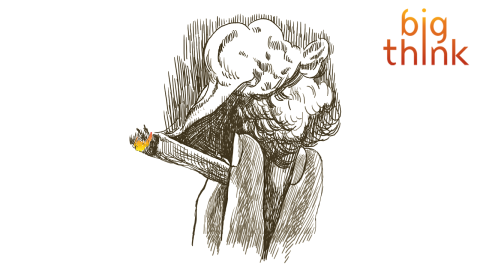Marijuana Legalization Will Follow in Same-Sex Marriage’s Footsteps, with Barney Frank

Retired Massachusetts Congressman Barney Frank has been an advocate for the decriminalization of marijuana for as long as he can remember. He introduced his first piece of legislation on that subject 41 years ago during the Nixon administration, which had just published a 400-page party-line report on the dangers of marijuana use. Rep. Frank was decidedly unimpressed.
The commission couldn’t prove that marijuana was addictive nor that it had a negative effect on people’s behavior nor, for that matter, did it cause anywhere near as much social ill as alcohol. Rep. Frank reflects on the Nixon report during his recent Big Think interview:
“They clearly had the mandate to say it should be illegal, they couldn’t think of any reasons for it. The only thing they could come up with is… it discouraged people’s work incentive and therefore it was not good for the economy. This is literally what they said that if marijuana smoking became or ingestion of any form became widespread that it would cost us economically because people would be too mellow to work hard.
When you’re in an argument, debate of any kind, discussion, you are a little worried is sometimes that there are arguments against your position that maybe you haven’t thought of that might be very persuasive. And nothing is more reassuring than to come up against the strongest argument from the other side and say gee, that’s not very important or not very impressive. And that’s what I did with marijuana.”
Since then, marijuana has been legalized in two states, decriminalized in 17 others (plus Washington D.C.), and is obtainable for medical purposes in twenty-three. Frank sees similarities between marijuana and same-sex marriage, insofar that their paths to legalization share many similar factors. First, they’re both generational. The charge for ending prohibition has been led by young people who abhor hypocrisy and whose experiences don’t match up with their parents’ baseless apprehensions.
The second factor is the existence and subsequent dispelling of social taboos. Frank points toward libertarianism and its effect on the way many Americans view legislation that unduly restricts personal freedom. For a prohibitive law to succeed, its reasoning should not be rooted in personal morality but rather in fighting a practice that can be reasonably proven to cause serious societal harm. Such is not the case for marijuana and same-sex marriage, and American citizens are getting wise to the truth:
“What happened was marijuana smoking became legal in some places, same-sex marriage became legal in some places and none of the negative effects that people had predicted occurred. Reality beat the prejudice. And as more and more places adopted the reality, the prejudice lost and lost and lost.”
Finally, Frank stresses that the push for decriminalizing marijuana features an additional wrinkle having to do with the discriminatory ways in which existing laws are enforced:
“You saw that in New York under Bloomberg where cops would stop black kids and hassle them for marijuana. Nobody thinks that there were not white kids smoking marijuana, but almost none of them ever got busted.”
Many African-American lawmakers initially supported tough drug penalties in hopes that they would protect vulnerable black neighborhoods from bad influences. The African-American leadership has, for the most part, since recanted due to the massive generational harm felt in their communities because of discriminatory enforcement and sentencing. The laws have backfired and now seem to only serve the purpose of sending nonviolent, disproportionately African-American offenders to prison.
For more on the push to legalize both marijuana and same-sex marriage, watch this clip from Rep. Frank’s Big Think interview:





